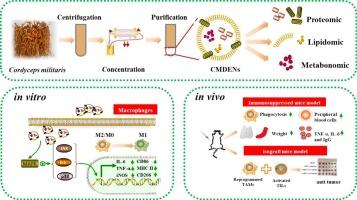A novel exosome-like nanovesicles from Cordyceps militaris potentiate immunomodulatory and anti-tumor effect by reprogramming macrophages
IF 5.2
2区 医学
Q1 MEDICINE, RESEARCH & EXPERIMENTAL
引用次数: 0
Abstract
Aims
Fungi-derived exosome-like nanovesicles (ENs) are emerging as a highly promising class of nanoparticles, particularly noted for their cost-effective production. However, their impact on immune regulation and their potential as anti-tumor agents need further exploration. Our study specifically focused on the investigation of the immunomodulatory and anti-tumor properties of ENs derived from Cordyceps militaris, an edible fungus that had achieved large-scale commercial production, referred to as CMDENs.
Main methods
The ENs of C. militaris were collected through ultra-high-speed centrifugation, followed by characterization of their physicochemical properties and contents. Subsequently, the biological distribution of these vesicles was investigated using in vivo fluorescence imaging experiments. Finally, the immune activation and polarization of macrophages were examined through both in vitro and in vivo experiments.
Key findings
Herein, we presented the discovery of CMDENs that were rich in proteins, lipids, flavonoids and alkaloids. Immunomodulatory experiments conducted in vivo demonstrated that CMDENs exhibited protective effects against cyclophosphamide-induced immunosuppression in mice by significantly enhancing macrophage phagocytosis and peripheral blood immune cell counts. Moreover, CMDENs effectively induced the polarization of M0- and M2-like macrophages toward M1-like phenotype by activating MAPKs signaling pathway. Notably, CMDENs exhibited remarkable capabilities in inhibiting tumor growth by reprogramming tumor-associated macrophages and activating tumor-infiltrating T lymphocytes, without any observed toxicity in mice bearing tumors.
Significance
Our research suggested that CMDENs possessed the potential to be explored as a nano-immunomodulatory agent for cancer.

冬虫夏草中的一种新型外泌体纳米颗粒通过对巨噬细胞进行重编程,增强了免疫调节和抗肿瘤作用。
目的:真菌衍生的类外泌体纳米颗粒(ENs)正在成为一类极具潜力的纳米颗粒,尤其是其生产成本低廉。然而,它们对免疫调节的影响及其作为抗肿瘤药物的潜力还需要进一步探索。我们的研究特别关注从冬虫夏草中提取的 ENs 的免疫调节和抗肿瘤特性,冬虫夏草是一种已实现大规模商业化生产的食用菌,被称为 CMDENs:主要方法:通过超高速离心收集冬虫夏草ENs,并对其理化性质和含量进行表征。随后,利用体内荧光成像实验研究了这些囊泡的生物分布。最后,通过体外和体内实验研究了巨噬细胞的免疫激活和极化:在此,我们发现了富含蛋白质、脂类、黄酮类和生物碱的 CMDENs。体内免疫调节实验表明,CMDENs对环磷酰胺诱导的小鼠免疫抑制具有保护作用,能显著提高巨噬细胞的吞噬能力和外周血免疫细胞数量。此外,CMDENs 还能通过激活 MAPKs 信号通路,有效诱导 M0 和 M2 样巨噬细胞向 M1 样表型极化。值得注意的是,CMDENs通过重编程肿瘤相关巨噬细胞和激活肿瘤浸润T淋巴细胞,在抑制肿瘤生长方面表现出了显著的能力,而且在携带肿瘤的小鼠体内未观察到任何毒性:我们的研究表明,CMDENs 具有作为纳米免疫调节剂治疗癌症的潜力。
本文章由计算机程序翻译,如有差异,请以英文原文为准。
求助全文
约1分钟内获得全文
求助全文
来源期刊

Life sciences
医学-药学
CiteScore
12.20
自引率
1.60%
发文量
841
审稿时长
6 months
期刊介绍:
Life Sciences is an international journal publishing articles that emphasize the molecular, cellular, and functional basis of therapy. The journal emphasizes the understanding of mechanism that is relevant to all aspects of human disease and translation to patients. All articles are rigorously reviewed.
The Journal favors publication of full-length papers where modern scientific technologies are used to explain molecular, cellular and physiological mechanisms. Articles that merely report observations are rarely accepted. Recommendations from the Declaration of Helsinki or NIH guidelines for care and use of laboratory animals must be adhered to. Articles should be written at a level accessible to readers who are non-specialists in the topic of the article themselves, but who are interested in the research. The Journal welcomes reviews on topics of wide interest to investigators in the life sciences. We particularly encourage submission of brief, focused reviews containing high-quality artwork and require the use of mechanistic summary diagrams.
 求助内容:
求助内容: 应助结果提醒方式:
应助结果提醒方式:


